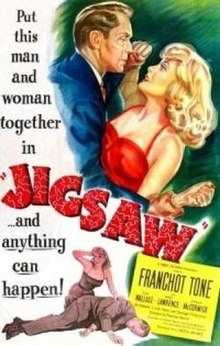
Crossfire is a 1947 American film noir drama film starring Robert Young, Robert Mitchum and Robert Ryan which deals with the theme of anti-Semitism, as did that year's Academy Award for Best Picture winner, Gentleman's Agreement. The film was directed by Edward Dmytryk and the screenplay was written by John Paxton, based on the 1945 novel The Brick Foxhole by screenwriter and director Richard Brooks. The film's supporting cast features Gloria Grahame and Sam Levene. The picture received five Oscar nominations, including Ryan for Best Supporting Actor and Gloria Grahame for Best Supporting Actress. It was the first B movie to receive a Best Picture nomination.

Stanislaus Pascal Franchot Tone was an American actor, producer, and director of stage, film and television. He was a leading man in the 1930s and early 1940s, and at the height of his career was known for his gentlemanly sophisticate roles, with supporting roles by the 1950s. His acting crossed many genres including pre-Code romantic leads to noir layered roles and World War I films. He appeared as a guest star in episodes of several golden age television series, including The Twilight Zone and The Alfred Hitchcock Hour while continuing to act and produce in the theater and movies throughout the 1960s.

Oliver Burgess Meredith was an American actor and filmmaker whose career encompassed theater, film, and television.
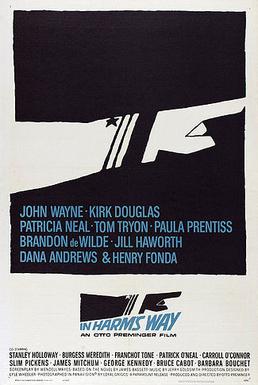
In Harm's Way is a 1965 American epic historical romantic war film produced and directed by Otto Preminger and starring John Wayne, Kirk Douglas, and Patricia Neal, with a supporting cast featuring Henry Fonda in a lengthy cameo, Tom Tryon, Paula Prentiss, Stanley Holloway, Burgess Meredith, Brandon deWilde, Jill Haworth, Dana Andrews, and Franchot Tone. Produced with Panavision motion picture equipment, it was one of the last black-and-white World War II epics, and Wayne's last black-and-white film. The screenplay was written by Wendell Mayes, based on the 1962 novel Harm's Way, by James Bassett.

Phantom Lady is a 1944 American film noir directed by Robert Siodmak and starring Franchot Tone, Ella Raines, and Alan Curtis. Based on the novel of the same name by Cornell Woolrich, it follows a young Manhattan secretary and her endeavors to prove that her boss did not murder his wife.

Francis Bosley Crowther Jr. was an American journalist, writer, and film critic for The New York Times for 27 years. His work helped shape the careers of many actors, directors and screenwriters, though his reviews were sometimes regarded as unnecessarily harsh. Crowther was an advocate of foreign-language films in the 1950s and 1960s, particularly those of Roberto Rossellini, Vittorio De Sica, Ingmar Bergman, and Federico Fellini.

The Underworld Story is a 1950 American film noir crime film directed by Cy Endfield and starring Dan Duryea, Herbert Marshall, Gale Storm, Howard Da Silva and Michael O'Shea. Da Silva plays the loud-mouthed gangster Carl Durham, one of his last roles before becoming blacklisted.

Nobody Lives Forever is a 1946 American crime film noir directed by Jean Negulesco and based on the novel I Wasn't Born Yesterday by W. R. Burnett. It stars John Garfield and Geraldine Fitzgerald and features Walter Brennan, Faye Emerson, George Coulouris and George Tobias.

Vicki is a 1953 American film noir directed by Harry Horner and starring Jeanne Crain and Jean Peters. It was based on the novel I Wake Up Screaming, written by Steve Fisher.
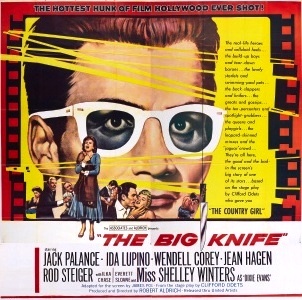
The Big Knife is a 1955 melodrama directed and produced by Robert Aldrich from a screenplay by James Poe based on the 1949 play by Clifford Odets. The film stars Jack Palance, Ida Lupino, Wendell Corey, Jean Hagen, Rod Steiger, Shelley Winters, Ilka Chase, and Everett Sloane.
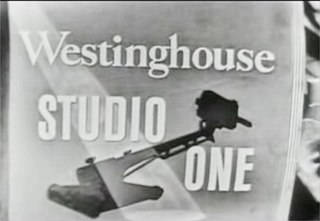
Studio One is an American anthology drama television series that was adapted from a radio series. It was created in 1947 by Canadian director Fletcher Markle, who came to CBS from the CBC. It premiered on November 7, 1948, and ended on September 29, 1958, with a total of 467 episodes over the course of 10 seasons.

Advise & Consent is a 1962 American political drama film based on the Pulitzer Prize-winning novel Advise and Consent by Allen Drury, published in 1959.

Every Girl Should Be Married is a 1948 American romantic comedy film directed by Don Hartman and starring Cary Grant, Betsy Drake and Franchot Tone. Grant and Drake married a year after the film's release.
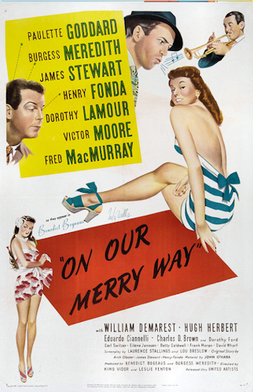
On Our Merry Way is a 1948 American comedy film produced by Benedict Bogeaus and Burgess Meredith and released by United Artists. At the time of its release, King Vidor and Leslie Fenton were credited with its direction, although the DVD lists John Huston and George Stevens, who assisted with one of the segments, as well. The screenplay by Laurence Stallings and Lou Breslow, based on an original story by Arch Oboler, is similar in style to that of Tales of Manhattan (1942), another anthology film made up of several vignettes linked by a single theme. The picture stars Paulette Goddard, Burgess Meredith, James Stewart, Henry Fonda, Harry James, Dorothy Lamour, Victor Moore and Fred MacMurray. It marks the first joint movie appearance of Stewart and Fonda, who play a pair of musicians in their section of the film.
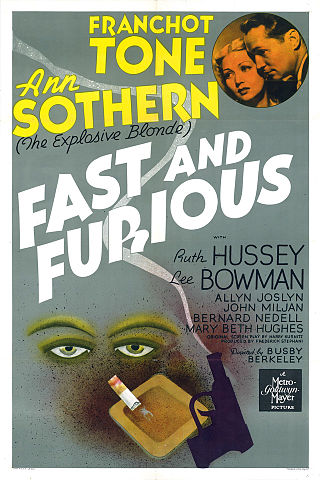
Fast and Furious is a 1939 American mystery comedy film directed by Busby Berkeley. The film stars Franchot Tone and Ann Sothern as Joel and Garda Sloane, a crime-solving married couple who are also rare book dealers. It is the last of a Metro-Goldwyn-Mayer trilogy, along with Fast Company (1938) and Fast and Loose (1939). However, different actors played the couple each time.

Detective Lieutenant Mark Hoffman is a fictional character and the secondary antagonist of the Saw franchise. He is portrayed by Australian actor Costas Mandylor. While the character was first shown as a police officer in Saw III, later films in the series have expanded his role and revealed him to be an apprentice, and subsequently the successor of the Jigsaw Killer, as the new Jigsaw. He serves as the secondary antagonist in Saw IV, and the main antagonist in Saw V, Saw VI and Saw 3D. He appears in the mid-credits scene of Saw X, setting up a new trap alongside Jigsaw.

The Man on the Eiffel Tower is a 1950 American Ansco Color film noir mystery film directed by Burgess Meredith and starring Charles Laughton, Franchot Tone, Meredith, and Robert Hutton. It is based on the 1931 novel La Tête d'un homme by Belgian writer Georges Simenon featuring his detective Jules Maigret. The film was co-produced by Tone and Irving Allen as A&T Film Productions and released by RKO Radio Pictures. Much of the outdoor action occurs in various familiar Paris locales.

Detective David Tapp is a fictional character from the Saw film franchise, portrayed by Danny Glover. Introduced in Saw (2004), he is a police detective investigating a series of crime scenes linked to the same murderer, later revealed to be the Jigsaw Killer, and serves as one of the film's protagonists. Tapp has also made appearances through archived footage and from being mentioned in Saw III (2006), Saw IV (2007), and Saw V (2008). He appeared as a playable character in both Saw: The Video Game (2009), in which he was voiced by Earl Alexander, and Dead by Daylight (2016), in which he was voiced by Dave Blake.

Take One False Step is a 1949 American film noir crime film directed by Chester Erskine and starring William Powell, Shelley Winters and Marsha Hunt. It was produced and distributed by Universal Pictures.

The Story of Molly X is a 1949 American film noir crime film directed by Crane Wilbur and starring June Havoc, John Russell and Dorothy Hart. The screenplay concerns a woman who tries to reform after being sent to prison, but faces obstacles.
